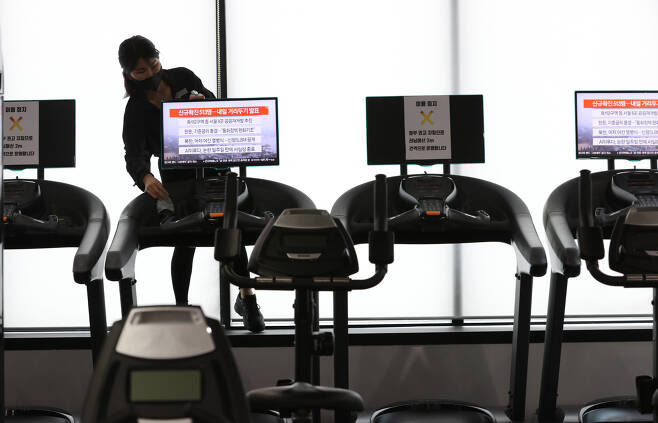Korea slightly eases social distancing rules
전체 맥락을 이해하기 위해서는 본문 보기를 권장합니다.
Businesses that have been forced to close say the social distancing orders were "no longer bearable."
"Businesses, especially those in the vulnerable sector, have had to endure stringent social distancing for nearly two months. It makes sense to cut them some slack."
이 글자크기로 변경됩니다.
(예시) 가장 빠른 뉴스가 있고 다양한 정보, 쌍방향 소통이 숨쉬는 다음뉴스를 만나보세요. 다음뉴스는 국내외 주요이슈와 실시간 속보, 문화생활 및 다양한 분야의 뉴스를 입체적으로 전달하고 있습니다.

Some businesses that have been shut down amid a winter surge in COVID-19 infections will be able to reopen in the coming week, as South Korea revises its social distancing rules in a tricky balance between health and the economy.
The government said over the weekend that indoor sports and karaoke facilities, which have been required to stay closed since early December, can reopen with some restrictions starting Monday. Cafes can open for indoor operations until 9 p.m., just like restaurants.
The ban on private gatherings of five or more people will remain in effect until the end of this month.
Businesses that have been forced to close say the social distancing orders were “no longer bearable.”
“I think there would have been an even stronger backlash if the closures were to go on,” said Bae Hye-min, who runs two Pilates studios in western Seoul.
Earlier this month, 153 operators of athletics facilities filed a claim for damages against the government totaling a combined 765 million won ($704,600). At one point some 700 gyms across the country reopened, without actually accepting customers, in protest of the bans.
Personal fitness trainer Lee Hoon-seok in Pocheon, Gyeonggi Province, said he welcomed the reopening, but called for more support from the government to make up for the time he was out of a job.
“I didn’t have any income for almost two months. But the monthly rent, utility bills, taxes didn’t stop,” he said.
Experts say it’s “worrying” that some of the restrictions are being relaxed so soon.
“Strictly speaking, coronavirus-wise, much of the public health intervention needs to be kept in place. Korea is still reporting fairly high rates of infections. The numbers just feel less alarming because we’ve come down from a peak of over 1,000 cases a day,” said epidemiologist Dr. Ki Moran.
Korea counted 520 more cases of COVID-19 on Sunday, a level that warrants the second-strictest restrictions in the country’s social distancing scheme, she said.
But if the health orders mean people’s livelihoods are being threatened, they cannot be sustained for long, she added.
“Businesses, especially those in the vulnerable sector, have had to endure stringent social distancing for nearly two months. It makes sense to cut them some slack.”
Ki stressed, however, that although the winter wave appears to have abated, there was no guarantee the infection rates would continue on a downward trajectory or stay at the current levels, even.
“Until enough of the population is vaccinated, varying degrees of social distancing are inevitable,” she said.
Family medicine physician Dr. Shim Kyung-won said more intensive social distancing was likely to be needed throughout the winter.
“We need to continue to exercise caution as there are around two months more of winter remaining,” she said.
Korea’s lack of compensation for pandemic-afflicted businesses is hurting its ability to control COVID-19, according to respiratory disease specialist Dr. Jung Ki-suck.
“Health officials have cited damage on businesses for not being able to enforce social distancing at critical junctures, which in turn worsened the outbreak,” said Jung, who led the Korea Centers for Disease Control and Prevention in 2016-2017.
“Social distancing is being implemented belatedly but slackened sooner than necessary. It’s become a pattern. And every time they say it’s for the businesses,” he said.
“If there were measures to help the businesses stay afloat during the closures, this would not have been an issue.”
Economics professor Ahn Dong-hyun of Seoul National University said, “The government has to pay businesses if it’s going to tell them to stay closed.”
“One of the defining characteristics of the pandemic is its uneven toll. Some are thriving while others are devastated, which is there should be a targeted as opposed to universal relief,” he said.
“It’s not fair to have some sectors bear the economic burden disproportionately.”
As businesses subject to shutdowns speak out, policy responses are now beginning to enter the dialogue in Korean politics.
Ruling Democratic Party of Korea Floor Leader Kim Tae-nyeon said the party would “come up with ways to assist small business owners and self-employed people who have suffered financial losses from the pandemic.”
“We have the resources to provide flexible solutions. Both sides have to come together to ensure the discussions don’t prove to be empty promises,” said Rep. Choi Seung-jae of the main opposition People Power Party.
By Kim Arin (arin@heraldcorp.com)
<ⓒKoreaHerald(www.koreaherald.com)무단전재 및 재배포 금지>
Copyright © 코리아헤럴드. 무단전재 및 재배포 금지.